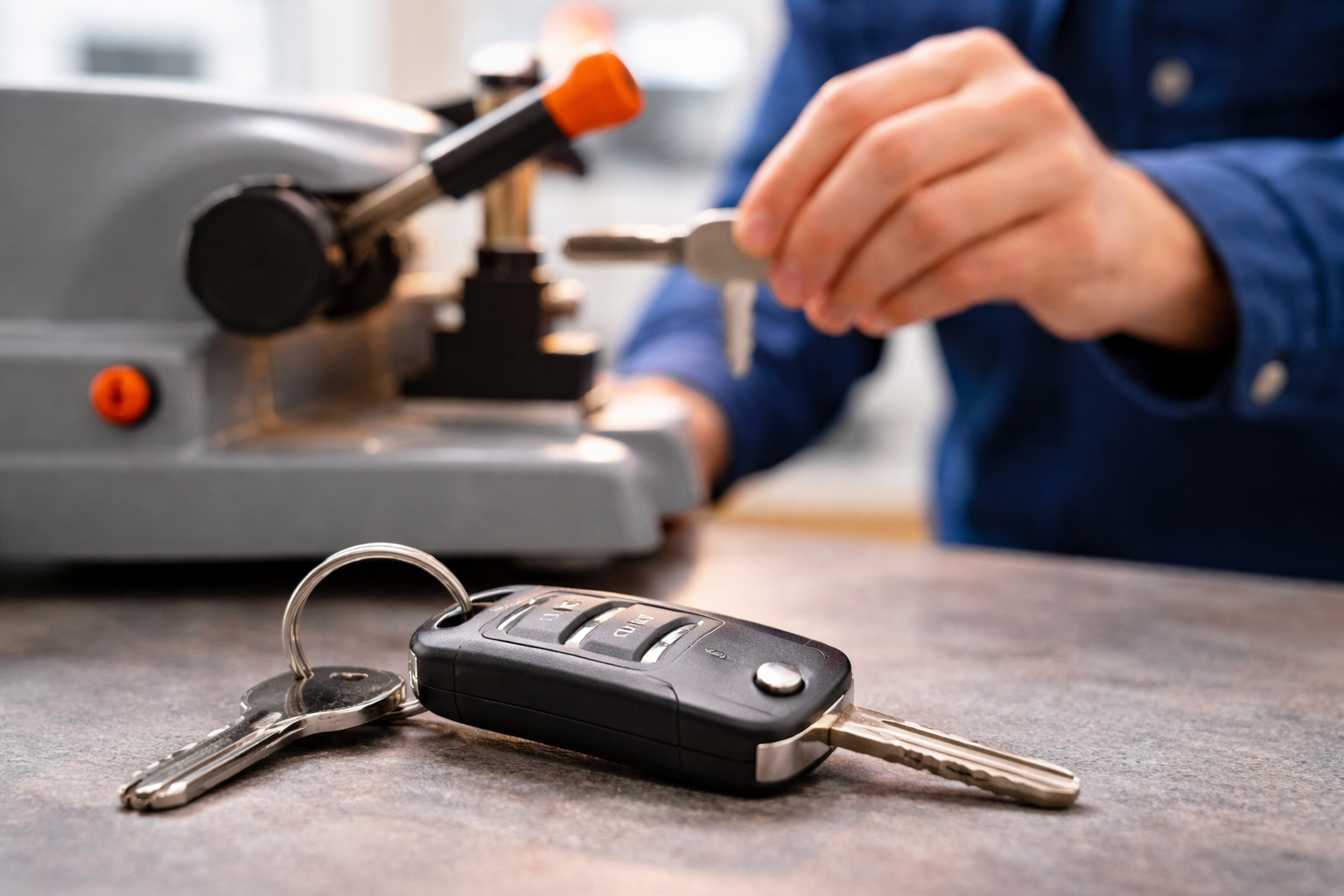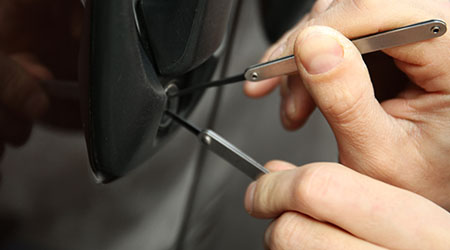Understanding Why Car Keys Wear Out
We often forget how much strain a car key goes through every day. Each time we turn the ignition or press a button on a fob, the small parts inside face pressure and friction. Over time, that wear builds up. Keys made of softer metals, like brass or nickel-plated steel, can lose their sharp edges faster than others.
However, it is not just the key itself that suffers. The ignition cylinder or the lock mechanism also wears when paired with a key that is slightly damaged. If both the key and the lock degrade together, the issue becomes more complex and costly. Knowing this helps us take better care of our keys before things get worse.
Daily Habits That Reduce Wear
Simple routines can make a huge difference in how long our car keys last. We should avoid putting too many other keys or heavy items on the same keyring. Extra weight causes unnecessary pressure on the ignition switch every time the car starts. As a result, both the key and ignition wear faster.
Another habit is keeping keys clean. Dirt and grit can get into grooves and cause damage when sliding into the lock. Wiping them down occasionally with a soft cloth helps. We should also resist forcing a key when it does not turn easily. Forcing adds stress to the teeth of the key and to the lock pins inside.
Protecting Key Fobs and Remote Keys
Modern cars rely on electronic keys and fobs, and these come with their own challenges. The most common issues are battery failure and worn buttons. We can protect them by keeping them dry, since moisture damages the electronic board inside. Extreme temperatures are another threat. Leaving keys in hot or freezing cars shortens their lifespan.
We should replace batteries before they completely die, instead of waiting until the remote stops working. A weak battery makes the fob work inconsistently, and that repeated pressing wears buttons. A small protective cover also keeps the buttons from getting stuck or breaking.
Spotting the Early Signs of Key Wear
It helps to know the early warnings before a key fails. If we notice the edges of a metal key feel rounded or smooth, that means wear is starting. A key that used to slide in easily but now feels tight is another sign. We may also hear clicking sounds or feel extra resistance when turning.
With fobs, unresponsive buttons, weak signal range, or the need to press multiple times are clues. Paying attention to these changes gives us time to act before the key breaks, which avoids being stranded unexpectedly.
What To Do When a Key Stops Working
Sometimes prevention is not enough, and a key eventually fails. If a metal key bends or breaks, we should avoid trying to force it into the ignition or lock. Doing so risks breaking it off inside, which creates a bigger problem. The smarter step is to have a spare ready. That way, we are not stuck when the main one gives out.
If the issue is with a fob, reprogramming or replacing it may be necessary. A professional can test whether the chip inside is still working. For more serious cases, like damage to the ignition itself, reaching out for specialized help is the safest choice. Reliable automotive services Ottawa providers handle these situations daily and prevent damage from getting worse.
Why Spare Keys Are Essential
We often underestimate the value of spare keys. Having an extra key ready saves time and stress in emergencies. It also reduces wear on any single key since we can rotate between them. Spares are especially important for vehicles with programmed transponder keys. If we lose the only working key, replacing it without a copy costs much more and takes longer.
Getting a spare cut and programmed while the original is in good shape is always easier. That way, even if one key fails, we have another to keep us moving. It is a small effort that pays off when problems arise.
How Professionals Repair Worn Keys
When wear does happen, professionals have the right tools to help. For metal keys, they can copy the key code rather than duplicate from the worn key. This ensures the new key matches factory specifications. It restores smooth use and prevents further lock damage.
For fobs, repair may involve reprogramming, battery replacement, or replacing worn buttons. Specialists can also check for hidden issues in the circuit board. Our team always recommends addressing these problems early instead of waiting until the key stops working completely.
Emergency Options if You’re Stranded
If a key fails while we are away from home, knowing what to do next matters. Trying to force the lock or tamper with the ignition often makes things worse. Instead, the best move is to contact an emergency locksmith. Many teams provide mobile support and arrive with the equipment needed to cut or program a new key on the spot.
We should always keep the contact details of a trusted service in our phone. If something happens late at night or in a remote spot, quick help is essential. For immediate assistance, reaching out through emergency car key help in Ottawa connects us to professional support without delays.
Long-Term Care for Ignitions and Locks
Even with careful key use, the locks and ignition must also be maintained. Over time, dust and grit build up inside. Using a non-greasy lock lubricant a few times a year helps keep the pins moving smoothly. This reduces stress on the key and makes turning easier.
It is also wise to pay attention to how the ignition feels. If turning starts to feel stiff, or if the key sticks, it is better to address it early. Leaving it unchecked puts more pressure on both the lock and the key, which leads to faster wear for both.
When Replacement Becomes the Only Option
There are times when repair is not enough. If a key is cracked, severely bent, or the electronic chip no longer responds, replacement is the only solution. Waiting too long risks complete failure at the worst time. Having a new key cut and programmed restores confidence and avoids ongoing problems.
Replacements should always be made from the correct codes, not copied from worn keys. This ensures a proper fit and function. Our team at Your Key Maker can guide drivers through this process, making it as straightforward as possible.
Why Regular Checks Matter
Routine inspections help us catch problems before they turn into emergencies. Checking keys, fobs, and locks every few months only takes minutes. Noticing small signs of damage early makes solutions simpler and less costly. We should treat car keys like any other essential tool, giving them care so they last longer.
A little awareness saves money and prevents stressful situations. We may not think about our keys daily, but when they fail, the impact is immediate. Taking time for regular checks keeps everything working smoothly.
Call to Action
Our team at Your Key Maker understands how frustrating key problems can be. We believe prevention is the best solution, but we also know issues sometimes happen unexpectedly. If you are dealing with worn keys, fobs, or ignition troubles, reach out for help. Visit our contact page to connect with us today and get professional support right when you need it most.
FAQ
How often should I replace the battery in my key fob?
Every one to two years is a good schedule, but if the signal weakens or buttons become unresponsive, replace it sooner.
Can I copy a worn key without problems?
Copying from a worn key can carry over flaws. It is better to cut a new one from the original code for a perfect fit.
Why does my ignition feel stiff even with a new key?
The lock itself may be dirty or worn. Cleaning and lubrication often help, but sometimes the cylinder needs repair.
Do spare keys work even if my main one has a chip?
Yes, as long as the spare is programmed correctly. A professional can duplicate both the cut and the transponder chip.
What should I do if my key breaks inside the lock?
Avoid trying to pull it out with force. Contact a locksmith who has extraction tools to remove it safely without damage.



